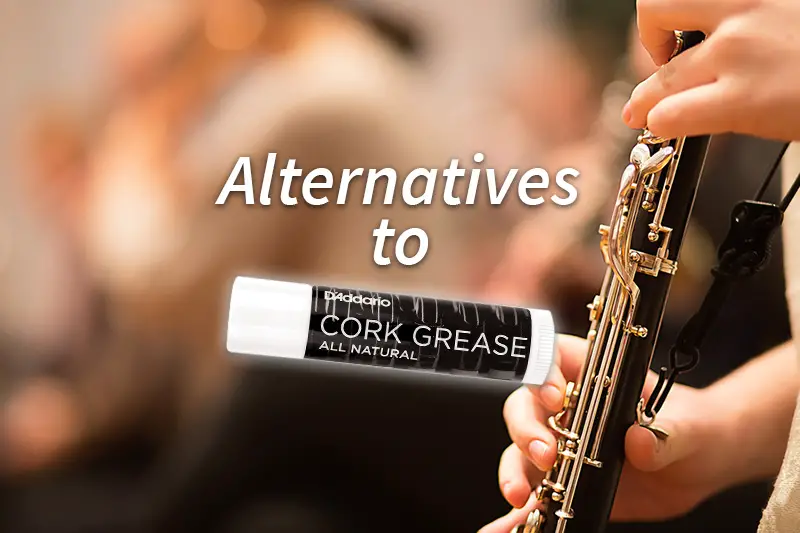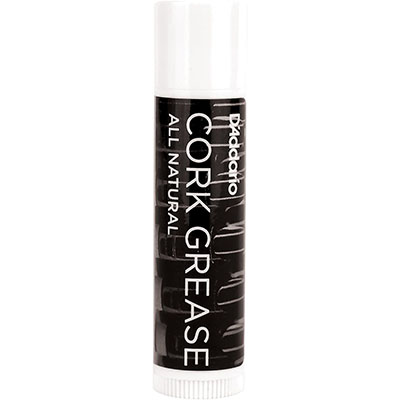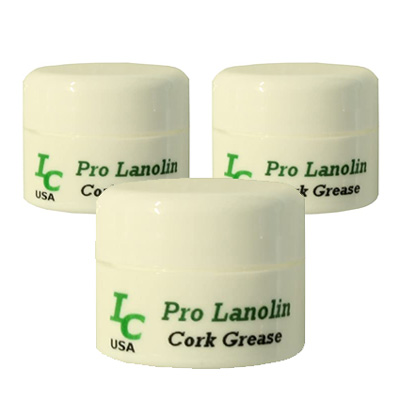Let’s say you’re out of cork grease. Lip balm looks similar so can you use it on your clarinet or saxophone cork? Does Vaseline work? There’s actually quite a few different alternatives to cork grease but most of them shouldn’t be used on your instrument.
Typically petroleum jelly (like Vaseline), lip balm, and lanolin are used as cork grease alternatives. You can also make your own cork grease with bee’s wax and a plant-based oil like coconut oil, or from tallow and lanolin. A good cork grease will both preserve and lubricate the cork but not harm your instrument. Both petroleum jelly and lip balm can be harmful to your instrument so these alternatives may not be a good idea.
If you’re out of cork grease and in desperate need, you could use lip balm as long as it’s good quality, unscented and unflavored. Or, you could simply borrow some cork grease from a friend.
 You could also skip greasing your corks today since you shouldn’t need to apply cork grease each time you play. However, applying cork grease is essential to maintaining your instrument and should you should use it every 2 or 3 times you play, depending on how dry or tight your tenon corks are. It’s used to both lubricate the cork for instrument assembly and also to seal the joints for proper airflow.
You could also skip greasing your corks today since you shouldn’t need to apply cork grease each time you play. However, applying cork grease is essential to maintaining your instrument and should you should use it every 2 or 3 times you play, depending on how dry or tight your tenon corks are. It’s used to both lubricate the cork for instrument assembly and also to seal the joints for proper airflow.
So if you’re out of cork grease, purchase more as soon as possible. You can usually find it at Walmart, your local musical instrument shop, or we have some all-natural cork grease that we recommend – it’ll ship quick, right to your house.
If you’re trying to save money, cork grease only costs a couple bucks and can last years. A good cork grease will be made of quality ingredients and is specifically designed to lubricate and preserve your tenon corks – so well worth the small cost.
Still looking for an alternative? Let’s dive into the options here. From hours of research, here’s a breakdown of the common alternatives to cork grease.
| Alternative | OK to use? | Drawbacks |
|---|---|---|
| Lip balm | Depends | Only use if unscented or unflavored. May cause residue. |
| Petroleum jelly | Depends | Can degrade the glue that holds cork in place. |
| Lanolin | Yes | Harder to find, doesn't come in tubes. |
| Coconut oil | No | Can go rancid, messy. |
| Mineral oil | No | Messy and hard to apply. |
| Wax | No | Doesn't penetrate cork or protect. |
| Make your own | Depends | Depends on ingredients, takes time to make. |
Can I use lip balm or Chapstick as an alternative to cork grease?
Lip balm looks pretty similar to cork grease but it’s not the same.
However, depending on the type and quality, your lip balm may actually work well for your tenon corks in a pinch.
Keep in mind that lip balm is specifically made for putting on your lips. Many “chapsticks” will include extra scents or flavors to make them smell and taste better. Those extra ingredients that make the lip balm more attractive could cause buildup or rancid smells on your cork over time.
Lip balms are not made to last long so they wouldn’t offer the protective qualities that you’d look for in a cork grease. Since they typically go on lips, they are made with ingredients that are gentler to the skin and won’t cause irritation. Typically lip balms will dry out faster too, leaving dried residue on your instrument.
Some of the unscented and unflavored lip balms may work pretty well as an alternative to cork grease though. These balms may be made from some of the same ingredients as cork grease including bee’s wax, natural plant oils, and other natural extracts.
In general though, lip balm won’t offer the same lubrication and protection as cork grease.
Can I use petroleum jelly or Vaseline as an alternative to cork grease?
Many musicians have used Vaseline or other petroleum jelly for their joint corks for years and haven’t had an issue. In fact, many swear by it and say that it even works better than cork grease.
After all, many brass players use petroleum jelly on their tuning slides.
However, Vaseline and other petroleum jellies are made from petroleum. Petroleum based products have been shown to degrade the glue that holds on the cork for the tenon joints in clarinets, saxophones, and other woodwind instruments. This can cause the cork to break down and fall off over time which means an extra visit to the musical instrument repair technician: an extra cost that you don’t need.
The bottom line is that Vaseline works great as an alternative to cork grease but if it penetrates the cork, can cause the glue holding the cork to stop working. So probably not worth the risk of using petroleum jelly on your cork.
Does lanolin work as an alternative for cork grease?
 Lanolin is a natural wax excretion from sheep that waterproofs their wool. Humans have extracted the lanolin from sheep’s wool for centuries and is currently used for ointments, cosmetics, and used as an ingredient for lubricants, shoe polish and yes – cork grease.
Lanolin is a natural wax excretion from sheep that waterproofs their wool. Humans have extracted the lanolin from sheep’s wool for centuries and is currently used for ointments, cosmetics, and used as an ingredient for lubricants, shoe polish and yes – cork grease.
Can it be used by itself instead of cork grease? Absolutely, yes. It has a different consistency (more sticky) and won’t come in a Chapstick-type tube but is all natural and spreads on smoothly, so a little goes a long way. Many clarinet and sax players who use lanolin, absolutely prefer it to standard cork grease.
Said one buyer on Amazon:
All I can say is that this product is so much better than the “tube/lipstick” cork grease that you see everywhere. I just got back into playing clarinet after 35+ years and found that the tube cork grease wasn’t offering the smooth connection that I remembered.
You can buy pure lanolin (Anhydrous USP) from eBay and other online stores, or specifically as cork grease on Amazon. If you buy the pure lanolin in bulk, you can really get the cost down ($9 for a half pound) versus the lanolin you’d by on Amazon in an easy to use container ($6 for three 0.25 jars).
However, the smaller containers are far more convenient to use so it’s really about cost versus convenience. If convenience is more important for you, here’s a convenient link to purchase lanolin cork grease.
Can I use coconut oil or olive oil as an alternative to cork grease?
Many plant oils can be a great ingredient for cork grease but should not be used by themselves.
As a lubricating liquid, oils can be quite messy and will be harder and take longer to apply. To fully protect a joint cork for you instrument, applying it would be troublesome and you’d probably have oil dripping inside and on the exterior of your instrument.
For organic oils, they could go bad over time as well, leaving an unpleasant odor. You don’t want rancid oil on your instrument.
Other possible alternatives to cork grease
These are purely anecdotal but some musicians say that these alternatives do the job too:
- Rendered yak fat
- Plumbers waterproof grease
- Paraffin
How to make homemade cork grease
If you’re willing to do a little work and experiment a bit, you can make your own cork grease. We’ve found a few loose recipes that should do the trick and appear to be great alternatives to cork grease. Basically though, you’ll looking for a stable wax mixed with an oil that won’t go bad.
- Recipe 1: 2 parts lanolin and 3 parts tallow
- Recipe 2: 2 parts Bee’s wax and 3 parts tallow
- Recipe 3: 1 part Bee’s wax and 1 part lanolin oil
- Recipe 4: 2 parts Bee’s wax and 3 parts mineral or plant-based oil
Traditionally, tallow and lanolin were used in making cork grease but many folks don’t like using animal products. Lanolin is the waxy excretion from sheep and tallow is rendered sheep fat.
That’s why many use bee’s wax with either a mineral oil or plant-based oil are preferred.
Blend these by melting in a saucepan at a low heat until they are fully liquid. Mix together and poor into jars or other heat resistant containers. Once they cool down, the mixture will solidify into a good consistency.
You can also add a drop of scented oil for smell. Vitamin E can help as an emulsifier to help mix the ingredients together.
Where can you find these ingredients?
You can pure lanolin at the drug store with the breast feeding supplies, or online. Bee’s wax can be purchased at a hobby or craft store, or online. Beef tallow can be found at many grocery stores but sheep tallow is probably easiest to find online. Mineral oil, canola oil, or coconut oils can all be found at the grocery store.
Can I use cork grease as lip balm?
You could use cork grease for your lips but you really, really shouldn’t!
Cork grease is made for instruments and not for your lips. Depending on the cork grease, it may have ingredients that your lips are sensitive to or are allergic too. It’s just not worth it!
From “bandmommy” in the Sax On The Web forum:
A young lady in one of our beginning bands used cork grease for chapstick with some very unsightly results. Think swollen, red, oozing lips from an allergic reaction.
Just go buy some cork grease!
Unless you are looking to make it yourself, it’s really better to just buy cork grease, either in the tube or in the jar form. Sure, there’s alternatives but it’s worth a couple of bucks to buy cork grease that’s made for your instrument.
If you’re looking to buy cork grease online, use the two links below or visit our cleaning supplies section. Or, you can pick some up locally at your local musical instrument shop or Walmart.
Hopefully this article was useful to you. If so, please share with your friends and HAPPY PLAYING!





